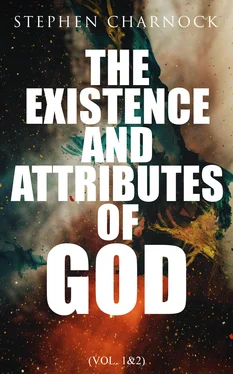Stephen Charnock - The Existence and Attributes of God (Vol. 1&2)
Здесь есть возможность читать онлайн «Stephen Charnock - The Existence and Attributes of God (Vol. 1&2)» — ознакомительный отрывок электронной книги совершенно бесплатно, а после прочтения отрывка купить полную версию. В некоторых случаях можно слушать аудио, скачать через торрент в формате fb2 и присутствует краткое содержание. Жанр: unrecognised, на английском языке. Описание произведения, (предисловие) а так же отзывы посетителей доступны на портале библиотеки ЛибКат.
- Название:The Existence and Attributes of God (Vol. 1&2)
- Автор:
- Жанр:
- Год:неизвестен
- ISBN:нет данных
- Рейтинг книги:3 / 5. Голосов: 1
-
Избранное:Добавить в избранное
- Отзывы:
-
Ваша оценка:
- 60
- 1
- 2
- 3
- 4
- 5
The Existence and Attributes of God (Vol. 1&2): краткое содержание, описание и аннотация
Предлагаем к чтению аннотацию, описание, краткое содержание или предисловие (зависит от того, что написал сам автор книги «The Existence and Attributes of God (Vol. 1&2)»). Если вы не нашли необходимую информацию о книге — напишите в комментариях, мы постараемся отыскать её.
The Existence and Attributes of God (Vol. 1&2) — читать онлайн ознакомительный отрывок
Ниже представлен текст книги, разбитый по страницам. Система сохранения места последней прочитанной страницы, позволяет с удобством читать онлайн бесплатно книгу «The Existence and Attributes of God (Vol. 1&2)», без необходимости каждый раз заново искать на чём Вы остановились. Поставьте закладку, и сможете в любой момент перейти на страницу, на которой закончили чтение.
Интервал:
Закладка:
But, 1. Doth not the growth of atheism among us render this necessary? may it not justly be suspected, that the swarms of atheists are more numerous in our times, than history records to have been in any age, when men will not only say it in their hearts, but publish it with their lips, and boast that they have shaken off those shackles which bind other men’s consciences? Doth not the barefaced debauchery of men evidence such a settled sentiment, or at least a careless belief of the truth, which lies at the root, and sprouts up in such venomous branches in the world? Can men’s hearts be free from that principle wherewith their practices are so openly depraved? It is true, the light of nature shines too vigorously for the power of man totally to put it out; yet loathsome actions impair and weaken the actual thoughts and considerations of a Deity, and are like mists that darken the light of the sun, though they cannot extinguish it: their consciences, as a candlestick, must hold it, though their unrighteousness obscure it, (Rom. i. 18). “Who hold the truth in unrighteousness.” The engraved characters of the law of nature remain, though they daub them with their muddy lusts to make them illegible: so that since the inconsideration of a Deity is the cause of all the wickedness and extravagances of men; and as Austin saith, the proposition is always true, the fool hath said in his heart, &c. and more evidently true in this age than any, it will not be unnecessary to discourse of the demonstrations of this first principle. The apostles spent little time in urging this truth; it was taken for granted all over the world, and they were generally devout in the worship of those idols they thought to be gods: that age run from one God to many, and our age is running from one God to none at all.
2. The existence of God is the foundation of all religion. The whole building totters if the foundation be out of course: if we have not deliberate and right notions of it, we shall perform no worship, no service, yield no affection to him. If there be not a God, it is impossible there can be one, for eternity is essential to the notion of a God; so all religion would be vain, and unreasonable to pay homage to that which is not in being, nor can ever be. We must first believe that he is, and that he is what he declares himself to be, before we can seek him, adore him, and devote our affections to him. 13We cannot pay God a due and regular homage, unless we understand him in his perfections, what he is; and we can pay him no homage at all, unless we believe that he is.
3. It is fit we should know why we believe, that our belief of a God may appear to be upon undeniable evidence, and that we may give a better reason for his existence, than that we have heard our parents and teachers tell us so, and our acquaintance think so. It is as much as to say there is no God, when we know not why we believe there is, and would not consider the arguments for his existence.
4. It is necessary to depress that secret atheism which is in the heart of every man by nature. Though every visible object which offers itself to our sense, presents a deity to our minds, and exhorts us to subscribe to the truth of it; yet there is a root of atheism springing up sometimes in wavering thoughts and foolish imaginations, inordinate actions, and secret wishes. Certain it is, that every man that doth not love God, denies God; now can he that disaffects him, and hath a slavish fear of him, wish his existence, and say to his own heart with any cheerfulness, there is a God, and make it his chief care to persuade himself of it? he would persuade himself there is no God, and stifle the seeds of it in his reason and conscience, that he might have the greatest liberty to entertain the allurements of the flesh. It is necessary to excite men to daily and actual considerations of God and his nature, which would be a bar to much of that wickedness which overflows in the lives of men.
5. Nor is it unuseful to those who effectually believe and love him; 14for those who have had a converse with God, and felt his powerful influences in the secrets of their hearts, to take a prospect of those satisfactory accounts which reason gives of that God they adore and love; to see every creature justify them in their owning of him, and affections to him: indeed the evidences of a God striking upon the conscience of those who resolve to cleave to sin as their chiefest darling, will dash their pleasures with unwelcome mixtures.
I shall further premise this, That the folly of atheism is evidenced by the light of reason. Men that will not listen to Scripture, as having no counterpart of it in their souls, cannot easily deny natural reason, which riseth up on all sides for the justification of this truth. There is a natural as well as a revealed knowledge, and the book of the creatures is legible in declaring the being of a God, as well as the Scriptures are in declaring the nature of a God; there are outward objects in the world, and common principles in the conscience, whence it may be inferred.
For, 1. God in regard of his existence is not only the discovery of faith, but of reason. God hath revealed not only his being, but some sparks of his eternal power and godhead in his works, as well as in his word. (Rom. i. 19, 20), “God hath showed it unto them,”—how? 15in his works; by the things that are made, it is a discovery to our reason, as shining in the creatures; and an object of our faith as breaking out upon us in the Scriptures: it is an article of our faith, and an article of our reason. Faith supposeth natural knowledge, as grace supposeth nature. Faith indeed is properly of things above reason, purely depending upon revelation. What can be demonstrated by natural light, is not so properly the object of faith; though in regard of the addition of a certainty by revelation it is so. The belief that God is, which the apostle speaks of, 16is not so much of the bare existence of God, as what God is in relation to them that seek him, viz. a rewarder. The apostle speaks of the faith of Abel, the faith of Enoch, such a faith that pleases God: but the faith of Abel testified in his sacrifice, and the faith of Enoch testified in his walking with God, was not simply a faith of the existence of God. Cain in the time of Abel, other men in the world in the time of Enoch, believed this as well as they: but it was a faith joined with the worship of God, and desires to please him in the way of his own appointment; so that they believed that God was such as he had declared himself to be in his promise to Adam, such an one as would be as good as his word, and bruise the serpent’s head. He that seeks to God according to the mind of God, must believe that he is such a God that will pardon sin, and justify a seeker of him; that he is a God of that ability and will, to justify a sinner in that way he hath appointed for the clearing the holiness of his nature, and vindicating the honor of his law violated by man. No man can seek God or love God, unless he believe him to be thus; and he cannot seek God without a discovery of his own mind how he would be sought. For it is not a seeking God in any way of man’s invention, that renders him capable of this desired fruit of a reward. He that believes God as a rewarder, must believe the promise of God concerning the Messiah. Men under the conscience of sin, cannot tell without a divine discovery, whether God will reward, or how he will reward the seekers of him; and therefore cannot act towards him as an object of faith. Would any man seek God merely because he is, or love him because he is, if he did not know that he should be acceptable to him? The bare existence of a thing is not the ground of affection to it, but those qualities of it and our interest in it, which render it amiable and delightful. How can men, whose consciences fly in their faces, seek God or love him, without this knowledge that he is a rewarder? Nature doth not show any way to a sinner, how to reconcile God’s provoked justice with his tenderness. The faith the apostle speaks of here is a faith that eyes the reward as an encouragement, and the will of God as the rule of its acting; he doth not speak simply of the existence of God.
Читать дальшеИнтервал:
Закладка:
Похожие книги на «The Existence and Attributes of God (Vol. 1&2)»
Представляем Вашему вниманию похожие книги на «The Existence and Attributes of God (Vol. 1&2)» списком для выбора. Мы отобрали схожую по названию и смыслу литературу в надежде предоставить читателям больше вариантов отыскать новые, интересные, ещё непрочитанные произведения.
Обсуждение, отзывы о книге «The Existence and Attributes of God (Vol. 1&2)» и просто собственные мнения читателей. Оставьте ваши комментарии, напишите, что Вы думаете о произведении, его смысле или главных героях. Укажите что конкретно понравилось, а что нет, и почему Вы так считаете.












